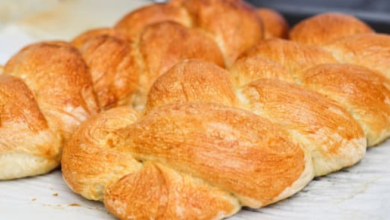Is It Possible to Let Challah Rise Overnight?

What To Know
- The extended fermentation process breaks down the sugars in the dough, resulting in a bread with a slightly sweet and tangy taste.
- Overnight rising gives the gluten strands more time to relax and develop, resulting in a bread with a softer, more airy texture.
- Refrigerate the dough in a cold part of the refrigerator, such as the back or bottom shelf.
The art of baking challah, a Jewish braided bread, requires patience and precision. One of the most common questions that arises is whether it’s possible to let challah bread rise overnight. The answer is a resounding yes! Overnight rising imparts a unique flavor and texture to your challah, making it a worthwhile technique to explore.
Benefits of Overnight Rising
Enhanced Flavor: Allowing the dough to rise slowly overnight allows the yeast to work its magic, developing a complex and nuanced flavor profile. The extended fermentation process breaks down the sugars in the dough, resulting in a bread with a slightly sweet and tangy taste.
Improved Texture: Overnight rising gives the gluten strands more time to relax and develop, resulting in a bread with a softer, more airy texture. The crumb becomes tender and fluffy, providing a delightful eating experience.
Convenience: Overnight rising is ideal for busy individuals or those who prefer to bake their challah the night before. It allows you to prepare the dough in advance and let it rise while you sleep, freeing up your time during the day.
Steps for Overnight Rising
1. Make the Dough: Prepare your challah dough as usual, following your preferred recipe.
2. First Rise: Allow the dough to rise at room temperature for about 1 hour, or until it has doubled in size.
3. Punch Down and Refrigerate: Once the dough has risen, punch it down to release the air bubbles. Transfer the dough to a lightly oiled bowl, cover it, and refrigerate for at least 8-12 hours or up to 24 hours.
4. Second Rise: Remove the dough from the refrigerator and allow it to come to room temperature for about 1 hour. Punch it down again and proceed with braiding and shaping the challah.
5. Final Rise: After shaping the challah, let it rise at room temperature for about 30-45 minutes, or until it has almost doubled in size.
6. Bake: Preheat your oven to the desired temperature and bake the challah according to the recipe instructions.
Tips for Successful Overnight Rising
- Use active dry yeast that has been proofed before adding it to the dough.
- Ensure that the dough is well-kneaded to develop the gluten.
- Cover the dough tightly with plastic wrap or a damp towel to prevent it from drying out.
- Refrigerate the dough in a cold part of the refrigerator, such as the back or bottom shelf.
- Don’t over-rise the dough. It should be almost doubled in size before baking.
Troubleshooting Overnight Rising
Dough Didn’t Rise Overnight: The dough may not have risen enough due to inactive yeast, insufficient kneading, or a cold refrigerator temperature.
Dough Rose Too Much: The dough may have over-risen due to warm refrigerator temperature, too much yeast, or an extended rising time.
Dough Became Dense: The dough may have been over-proofed or the gluten strands may not have been sufficiently developed.
Variations on Overnight Rising
Cold Rise: Refrigerate the dough for up to 3 days before baking. This extended refrigeration time results in a more pronounced tangy flavor.
Room Temperature Rise: Allow the dough to rise at room temperature for 8-12 hours. This method yields a bread with a milder flavor and a slightly denser texture.
Takeaways: Elevate Your Challah with Overnight Rising
Overnight rising is a simple yet transformative technique that can elevate your challah baking game. By allowing the dough to rise slowly, you’ll create a bread with exceptional flavor, texture, and convenience. Experiment with different variations and find the method that best suits your preferences and schedule.
Answers to Your Most Common Questions
1. How long can I refrigerate the dough for overnight rising?
A: You can refrigerate the dough for 8-12 hours or up to 24 hours.
2. Can I freeze the dough after overnight rising?
A: Yes, you can freeze the dough after overnight rising. Wrap it tightly in plastic wrap and freeze for up to 3 months.
3. How do I know if the dough has risen enough after overnight rising?
A: The dough should have almost doubled in size and should be slightly springy to the touch.




